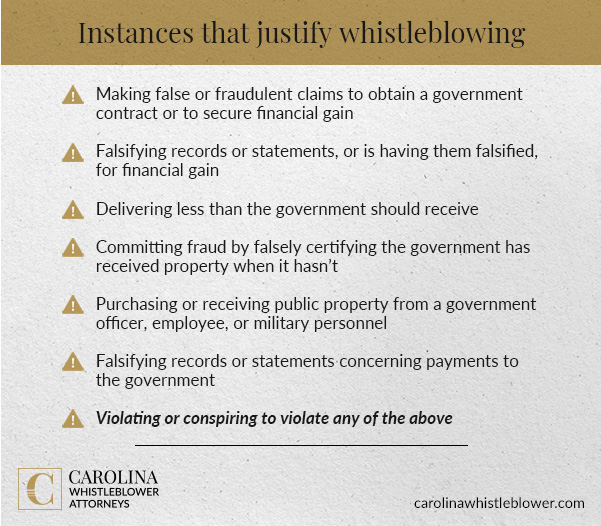As a child, when you saw someone doing something wrong, there was no question of what to do next. You told your parents. We all did. But as we grow up, we encounter more abstract thinking, and the idea of being a “snitch” becomes a social label and a stigma to be avoided. At some point, we learn that the “right” thing is to keep our mouths shut. It’s not our business.
Problem is, it almost always is.
Blowing the whistle means trusting yourself
The key is the evidence, and an experienced whistleblower attorney can help you gather it and build a case. The goal is to prove that someone is guilty of knowingly wasting or committing fraud with (or for) government funds. Most people will know it when they see it. From there, it’s just a matter of documenting.

Here are some instances when blowing the whistle is absolutely the right move. Can you obtain evidence that someone did any of the following?
- Made false or fraudulent claims to obtain a government contract or to secure financial gain? For example, if you are in the healthcare field, have you witnessed “upcoding” or double coding?” Such acts may be as clear a case as there is. Falsifying anything is a road to ruin, and doing so for financial gain is a crime.
- Falsified records or statements, or is having them falsified, for financial gain? There’s that word again – falsify. That’s basically lying in writing. Having the evidence of such behavior is certainly grounds for a claim. For instance, have you become aware of a federal contractor misrepresenting the minority status of his subcontractor in order to land a lucrative agreement?
- Delivered less than the government should receive? In other words, stealing. If the government agrees to exchange money and/or property, it should get what is agreed, or what it pays for. Anything less is theft.
- Committed fraud by falsely certifying the government has received property when it hasn’t? This can be negligence, or it can be done with intent. If someone is just signing off on deliveries without ever verifying that goods or services were delivered, the government and taxpayers may be being cheated.
- Purchased or received public property from a government officer, employee, or military personnel? Basically, is someone selling government property for their own gain? It’s public property, and it belongs to the public. The property could be anything from land to guns to office supplies. It doesn’t matter what it is. Someone is getting something for themselves by giving away something that isn’t theirs to give.
- Falsified records or statements concerning payments to the government – In this case, someone lies and says the government got what it was supposed to get when, in reality, it did not. Fraud, in other words.
- Violated or conspired to violate any of the above – Caught someone conspiring, or planning, to do any of what’s above? That’s also grounds for a whistleblower claim. Anyone who does these things is essentially stealing from taxpayers and reporting it is a favor to us all.
He or she who hesitates, misses out
Whistleblower/qui tam claims are first come, first served in a manner of speaking. According to the False Claims Act, only the first person or entity to file a claim is in the best position to receive a potential award. If someone else or the government itself files first with the same evidence you have, their claim will generally trump yours.
This all means that time is of the essence!
Contact an experienced Carolina Whistleblower Attorney
If you suspect fraud against the federal or state government, let’s talk. We are here to help put you at ease as we try to help you determine – confidentially and discreetly – if you should move forward with a whistleblower/qui tam claim. We appreciate the struggle you may be facing. That is why we have our You-First Policy in place. We will try to help protect you regardless of your involvement.
Contact us or call 1-888-292-8852. If we decide to take your case and you don’t get a reward for reporting fraud, you owe us no fee.2
Similar Articles
Government Fraud | September 22, 2024
Report PPP Loan Fraud Under the False Claims Act (FCA): What You Need to Know
In the wake of the 2020 pandemic, the federal government established the Paycheck Protection Program...
Hiring an Attorney | March 17, 2024
What Is a U.S. Attorney? And How a Former One Helps Your FCA Whistleblower Case
A U.S. attorney is a White House-appointed prosecutor and the top law enforcement officer for...
North Carolina Whistleblower | September 07, 2023
The Whistleblower Process in North and South Carolina: An Infographic
When people cheat the government, they are also cheating the taxpaying public that the government...
Contact the Carolina
Whistleblower Attorneys
If you’re wondering if it’s a good idea to speak with a whistleblower lawyer about what you know, let us set the record straight.
- Corporate ethics hotlines can be risky and may lead to termination. If you’ve already done this, call us immediately.
- Your coworkers could be aware of the fraud – or complicit in it – and you should not talk to them about it.
- The first claim to be filed under the False Claims Act can proceed – if you’re not first, you’re at a serious disadvantage and may get nothing (another reason not to speak to your coworkers about it).
- A confidential discussion costs you a few minutes, but could save you time, stress, and money.
"*" indicates required fields
